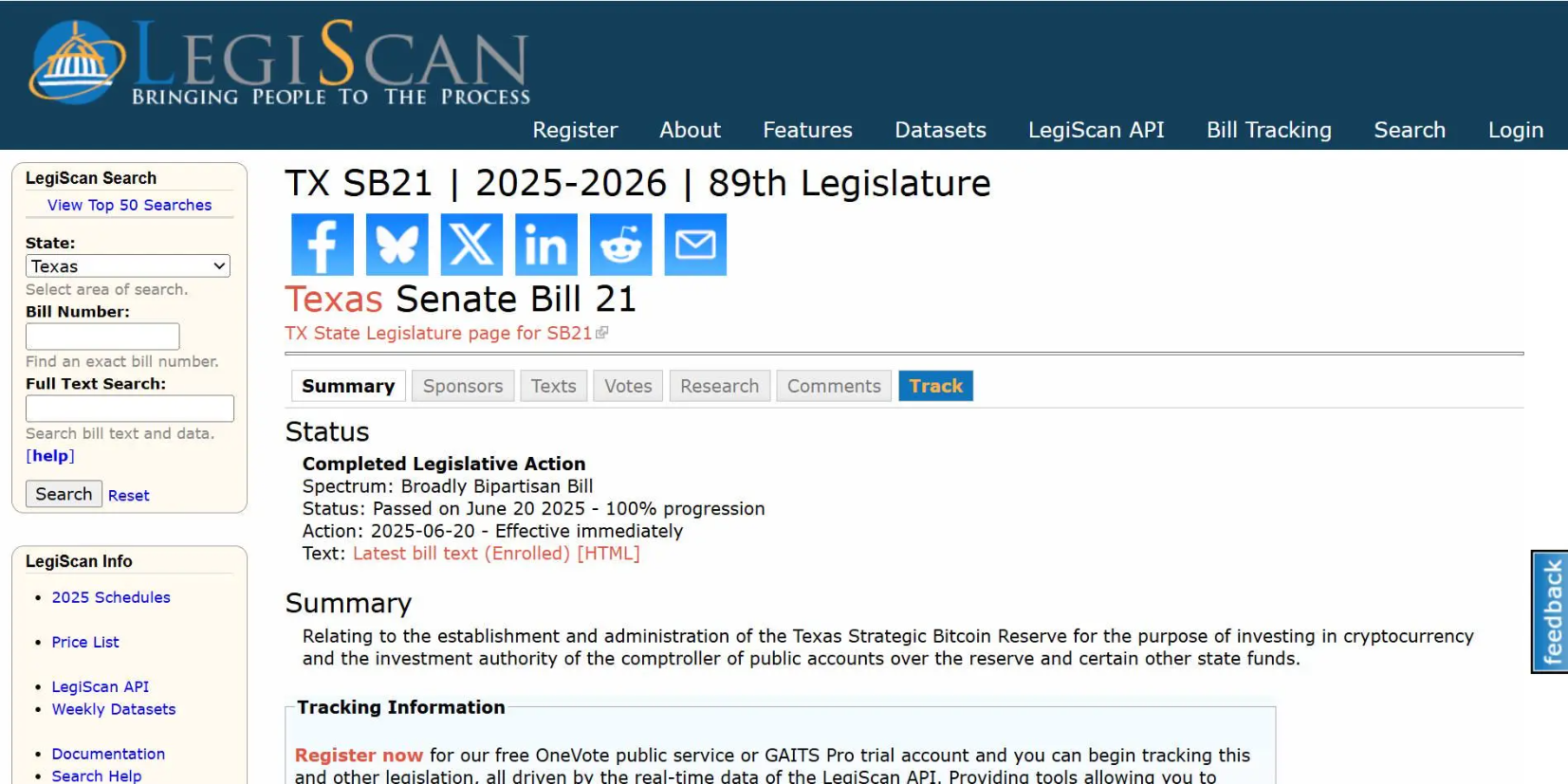 Block A Level 8, Sky Park One City, Jalan USJ 25/1B, 47650 Subang Jaya, Selangor,Malaysia
Block A Level 8, Sky Park One City, Jalan USJ 25/1B, 47650 Subang Jaya, Selangor,Malaysia
und erhalte wöchentliche Preislisten und Bestandsberichte der PunkHash-Miner.
 Abonniere den PunkHash-Kanal
Abonniere den PunkHash-Kanal



Under SB 21, Texas will allocate $10 million from its biennial state budget to purchase Bitcoin as part of a new Strategic Bitcoin Reserve. The reserve will be overseen by the Texas Comptroller’s Office but held outside the traditional state treasury, offering flexibility and insulation from typical budgetary cycles.
A companion bill, House Bill 4488, ensures that this fund won’t be swept back into general coffers during financial reallocations. Even if no Bitcoin is purchased before the end of the current fiscal year, the reserve's legal status remains intact.
Lawmakers backing the bill see Bitcoin as more than a speculative asset. SB 21 identifies Bitcoin as a strategic tool to protect Texas against inflation, economic instability, and the weakening of the U.S. dollar. The bill describes the reserve as a financial buffer designed to enhance long-term resilience for the state and its residents.
Assets in the reserve may include:
Bitcoin and other qualified cryptocurrencies
Forked coins or airdrops associated with the original assets
Income from interest, staking rewards, or investment returns
The Texas Comptroller is granted authority to invest, trade, or hold cryptocurrencies under the prudent investor rule. The state may contract third-party entities — such as licensed custodians and liquidity providers — to facilitate secure storage and asset management.
To qualify as a liquidity provider, a company must:
Be registered and audited under U.S. federal or Texas law
Have at least five years of experience in crypto asset trading
Maintain a physical presence in Texas
Submit to a certification process by the Comptroller
Only cryptocurrencies with a 24-month average market cap exceeding $500 billion may be considered for purchase — a standard that currently only Bitcoin meets.
The law also creates a five-member advisory committee, including the Comptroller, one investment expert, and three crypto specialists, to guide strategy and asset valuation.

Representative Giovanni Capriglione, one of the key sponsors of SB 21, views the Bitcoin reserve as a natural progression from his earlier work establishing the Texas Bullion Depository in 2015 — the first state-run gold and silver vault in the U.S.
“For me, this is about giving Texans the freedom to hold value in the medium of exchange they trust, whether it’s cash, precious metals, or Bitcoin,” he said during a recent public discussion.
Capriglione purchased his first Bitcoin over a decade ago and has since advocated for its potential to give individuals more control over their financial destiny — independent of federal oversight.
He emphasized that Texas’ Bitcoin reserve isn’t meant to compete with its gold reserves but rather to complement them. Both serve as scarce, inflation-resistant stores of value.
Texas isn’t alone in this policy experiment. Arizona recently passed HB 2324 to establish a Bitcoin reserve using assets seized in criminal investigations. Other states like New Hampshire are also exploring similar frameworks.
According to Zack Shapiro of the Bitcoin Policy Institute, state-level Bitcoin reserves are a response to limitations U.S. states face — unlike the federal government, they cannot print money or issue sovereign debt, yet they carry long-term obligations like pensions and infrastructure.
Strategic Bitcoin Reserves, or SBRs, could help states protect public funds from inflation and ensure financial obligations are met in the future.
Shapiro also floated the idea of Bitcoin-backed municipal bonds (BitBonds), potentially offering tax-free Bitcoin yield opportunities to investors — a concept Texas may explore next.
Texas’ $10 million Bitcoin reserve may seem small — accounting for only 0.00004% of the state’s total budget — but it serves as a high-profile pilot program. The real test lies ahead: whether the Comptroller’s office and its investment arm, the Texas Treasury Safekeeping Trust Company (TTSTC), can successfully manage, safeguard, and scale this unique digital reserve.
Lee Bratcher, President of the Texas Blockchain Council, confirmed that regular meetings are being held with crypto firms interested in bidding on the reserve's custody and investment management. These discussions aim to ensure a transparent and competitive procurement process.
Crucially, SB 21 encourages direct Bitcoin custody — not just exposure via ETFs. The goal is for Texas to own and control its private keys, a move that reflects the decentralized ethos of Bitcoin itself.

 Block A Level 8, Sky Park One City, Jalan USJ 25/1B, 47650 Subang Jaya, Selangor,Malaysia
Block A Level 8, Sky Park One City, Jalan USJ 25/1B, 47650 Subang Jaya, Selangor,Malaysia
 +(60)116 999 5678
+(60)116 999 5678


 arvin.cn.work@gmail.com
arvin.cn.work@gmail.com